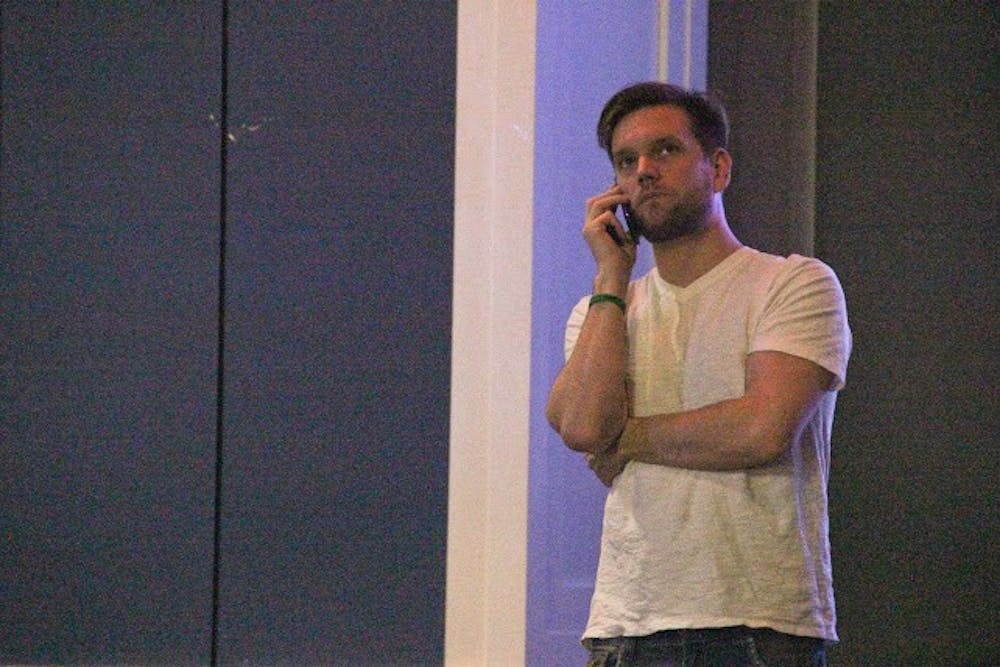By Mackenzie Cutruzzula
Arts & Entertainment Assistant
Concluding Mental Health Awareness Month, Counseling and Psychological Services (CAPS) brought Josh Rivedal, an actor and playwright, to campus to perform his one-man show. “The Gospel According to Josh” is a theatrical learning experience centered on suicide prevention and mental health awareness.
The show began with Rivedal acting out a scene from his Christian school upbringing in Trenton, N.J. Rivedal transitioned between scenes, explaining the context and how these moments impacted his life. With just three props, he also gave the audience an inside look at his family life, which includes an abusive father and compliant mother.
The only thing consistent in his life was the “cult-like atmosphere” he found in church and school. Rivedal was always searching for an escape from his childhood home where he wasn’t allowed to watch television and had to help pick up lint on his hands and knees because they didn’t own a vacuum. He knew from a young age that Hollywood would save him.
“I always wanted to be a movie star,” Rivedal said. “I would turn on the TV very quietly when I was supposed to be taking a nap.”
Rivedal started his journey to Hollywood by acting in his Bible youth group plays and singing in choir. In high school, his father hoped he would play football, but at 5’2’’ and 130 pounds, he found himself instead landing the lead role of Danny Zuko in “Grease.” After getting a taste of acting outside of church, Rivedal couldn’t stop. Foregoing college at first, he eventually attended community college and began auditioning in New York. Rivedal included the scene of his first professional audition in his 45-minute act. As Rivedal’s career started to grow, however, his family life began to take a toll.

Rivedal’s parents divorced, sending his father on an emotional journey that would affect Josh personally. His father became depressed and ultimately committed suicide, adding to a history of suicide in the Rivedal family that included Josh’s paternal grandfather. After discovering that his father blamed his suicide on the divorce, Rivedal knew he wanted to break the cycle in his family.
“I am never going to kill myself, I promise you that,” Rivedal said while saying farewell to his father at his funeral. “And I never knew how hard it would be to keep that promise,” he then told the audience.
In 2009, after his father’s death, Rivedal took his life experiences to the stage through “The Gospel According to Josh,” originally an 80-minute show with more scenes from his childhood. However, after a bad break-up, a poor relationship with his mother and the death of his father, Rivedal found himself retreating from his everyday life into his own world of depression. After about three weeks of residing in a depressive state, Rivedal reached out to his mother and was finally able to feel relief. Rivedal found personal help by seeing a counselor, and he eventually discovered what would keep him alive: promoting suicide prevention and helping others stay alive.
After hearing many people misspeak about suicide and depression, Rivedal wanted to modify his show as a tool to educate and inform his viewers. Shortening the show, Rivedal now includes a conversational component with a PowerPoint and time for questions.
“I’m here to clear up misconceptions,” Rivedal said. “To have any chance against suicide, we need to know what it looks like.”
The second half of his routine included tips for noticing red flags and encouraging friends to seek help if you think they are in trouble. He noted that giving people extra face-to-face attention could be what ultimately saves them. By giving statistics and resources that he modifies to fit the region for every show, Rivedal hopes to create a safety net for mental health, cognizant that anyone can fall. Along with the help of professors and health professionals from the College, Rivedal stressed the New Jersey Hopeline — (855)-654-6735 —and CAPS services for those seeking help.

Rivedal has now expanded his show beyond schools, telling his story to veterans and juvenile detention centers, and he plans on taking it outside of the U.S. in the coming year, as well. To carry his message to as many people as possible, he is publishing his second book, “I’MPossible,” which focuses on the stories of 40 people Rivedal has met along his journey, taking the spotlight off him and highlighting other people of inspiration.
“All of these projects have been a piece of my recovery,” he said. “Now it’s my sense of purpose. My life is making a difference.”







